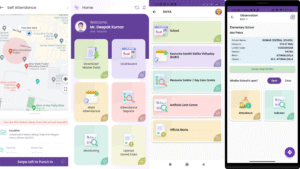
How Google Cloud Platform (GCP) Revolutionizes Cloud Computing?
The leading worldwide cloud computing solution offered by Google is Google Cloud Platform. From business-critical digital infrastructures to artificial intelligence and machine learning, compute, storage, databases, analytics, networking, and developer tools, the GCP offering is broad, complete, safe, and known for being on the bleeding edge of invention.
As long as a user has an internet connection, they can access the Google Cloud Platform from anywhere in the world. Additionally, providing tools and solutions for edge computing and private clouds, or on-site data centres, is GCP.
What Is Google Cloud Platform (GCP)?
Like rivals Amazon Web Services (AWS) and Microsoft Azure, GCP is a public cloud vendor. Users can access computer resources stored in Google’s global data centres at no cost or on a pay-per-use basis through GCP and other cloud providers. GCP offers a wide range of computing services, including cost control, data management, web and video delivery, and AI and machine learning tools.
How Is The Google Cloud Platform Different From The Google Cloud Platform?
Professionals agree that there is a slight distinction between Google Cloud and Google Cloud Platform, despite their sometimes synonymous use. Typically, the term “Google Cloud” encompasses all of Google’s cloud computing services. This covers GCP as well as those connected to Google products that are ready for use and accessible all around, such as Google Workspace (G Suite) and Google Maps Platform. Particularly referring to Google’s cloud computing offerings—App Engine, Cloud Storage, BigQuery, and Looker Studio—Google Cloud Platform.
What Are The Reasons To Use Google Cloud Platform?
Google runs all of the services it offers to consumers—including Gmail and Google Search—using its worldwide digital infrastructure, leveraging Google Cloud Platform. Millions of businesses and consumers worldwide, from large firms to startups and independent developers, also use GCP.
Companies specifically use Google Cloud Platform to create, implement, and oversee cloud-based applications, including:
- GCP offers virtual machines, containers, and load balancers, among other services, for hosting web apps.
- Retailers run their e-commerce systems, personalize the purchasing experience, and learn from consumer data using GCP.
- Manufacturers, energy, aerospace, pharmaceuticals, and other Fourth Industrial Revolution-related businesses use the GCP to maximize their supply chains, create digital twins, control robotics and industrial IoT, raise product quality, forecast demand, and avoid disruptions.
- GCP promotes business outcomes, hosts financial systems, assists firms in complying with regulations, prevents fraud, and aids in the development of new products and services, spanning from capital markets to banking, blockchain, neobanks, and insurance.
- GCP lets doctors drive remote health, safely store and examine patient data, boost research and development, and so improve patient diagnosis, treatment, and care.
Is It Possible To Use Google Cloud Platform For Free?
Anyone can begin using the Google Cloud Platform for free. To run, test, and implement workloads, GCP offers consumers $300 in free credit. With monthly usage restrictions, all subscribers can access 20+ free products.
Google provides GCP workloads under a pay-as-you-go approach with no upfront payments and no termination penalties when free credits run out. The Google Cloud Platform offers a variety of tools and features. Every price relies on the product itself and its use. For further comprehensive information, customers can view the official list of GCP goods.
Google Cloud vs Google Cloud Platform
Google Cloud offers a mix of online tools meant to enable companies to go digital. Google Cloud Platform is a component of Google Cloud; it offers public cloud infrastructure for hosting web-based applications, and that is the emphasis of this blog post.
Google Cloud also provides several other services.
- Previously called G Suite and Google Apps, Google Workspace This solution offers Gmail, corporate identity management, and teamwork features.
- Enterprise iterations of Chrome OS and Android. These operating systems for phones and laptops let users access web-based applications.
- We utilize programming interfaces (APIs) for enterprise mapping and machine learning. These give software-to-software communication.
- Although Google Workplace’s backbone is its GCP cloud infrastructure, these applications aren’t what we mean when we discuss GCP. Our post will focus on the Google Cloud Platform.
Google Cloud Platform’s development history
Let’s take a slight detour and first review the history of GCP.
GCP launched its first online product, App Engine, in 2008. Google revealed a preview of App Engine, a developer tool letting users run their web applications on Google infrastructure, in April 2008. For context, this was two years after Amazon introduced its cloud computing offering, starting with the release of S3 cloud storage and EC2. According to Google, App Engine’s goals are to “make it easy to start with a new web app, then make it easy to scale when that app reaches the point where it’s receiving significant traffic and has millions of users.”
Google Cloud Platform App Engine is available to 10,000 developers so they can provide the necessary feedback to improve this preview edition. These early adopters might operate programs with 10 GB of bandwidth daily, 500 MB of storage, and 200 million CPU cycles every day. Google officially launched App Engine as a fully supported Google product after pulling it out of preview mode in late 2011. Google has developed and acquired more services and products to improve the user experience of its cloud platform in the past ten years.
Google Cloud Platform is among the top public cloud providers available worldwide nowadays. Customers of Google Cloud span Nintendo, eBay, UPS, The Home Depot, Etsy, PayPal, 20th Century Fox, and Twitter.
For What Size Company Is Google Cloud Platform Appropriate?
Given that Google Cloud Platform is a publicly available product, getting its services is not difficult. The two main concerns are planning your migration and determining whether the platform is the appropriate one for your company.
Recall that being digital shouldn’t be a goal in and of itself. Make sure your digital transformation and cloud migration coincide with your company’s results. First, consider what your company aims to achieve and what you wish to accomplish. If you want to break silos, be customer-centric, data-driven, or else investigate the GCP tools that will enable your company to reach those goals.
For companies maybe dipping their toes in the water, Google does have free credits available. Whether you run a startup or a big company, Google Cloud Platform provides a wide spectrum of capabilities for industry-specific use cases, first-rate support, modern technologies, strong cybersecurity, compliance, and privacy.
FAQs
How are Google Cloud and Google Cloud Platform different?
Google Cloud offers a mix of online tools meant to enable companies to go digital. The emphasis of this blog post is Google Cloud Platform, which offers public cloud infrastructure for hosting web-based apps.
How did Google Cloud Platform get underway?
Originally launched in 2008, GCP first became online with the release of App Engine, a developer tool enabling consumers to run their web applications on Google infrastructure. Google officially launched App Engine as a fully supported Google product after pulling it out of preview mode in late 2011.
How do you use Google Cloud Platform?
Though GCP provides a lot of services, just to mention a few: computing and hosting, storage and databases, networking, big data, and machine learning.







